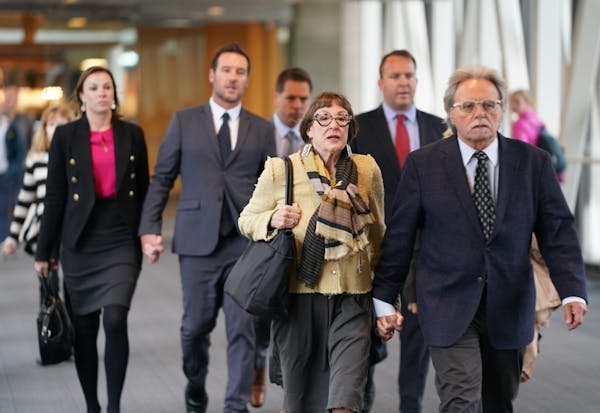Gov. Tim Walz said Wednesday his office is looking into the state's investigation of the shooting of Justine Ruszczyk Damond, after prosecutors alleged missteps by the agency during the trial that found an ex-Minneapolis police officer guilty in her death.
Hennepin County prosecutors, who won murder and manslaughter convictions Tuesday against Mohamed Noor for the 2017 shooting, built their case in part by suggesting that Bureau of Criminal Apprehension (BCA) agents had fallen short by failing to question key witnesses and allowing Noor's partner, Matthew Harrity, to be interviewed at the home of his attorney days after the shooting.
Damond's family, at a news conference following the verdict, directly accused the initial BCA agents assigned to the case of bungling the job, with the victim's father saying they showed "gross incompetence.''
County Attorney Mike Freeman gave support to the family's assertions, acknowledging that "initially" there were mistakes. However, Freeman said that the BCA later brought in new agents who did exemplary work on the case.
Walz took note.
"As those accusations started to come up, I've asked for us as the trial ended to gather all that information and see where it was coming from and go back and piece together a post-mortem," Walz said.
Walz spokesman Teddy Tschann said the office will meet with BCA officials.
The BCA is the statewide criminal investigative agency under the Minnesota Department of Public Safety, which reports to Walz. BCA spokeswoman Jill Oliveira said the agency "will work with the governor's office on his request."
Walz added that he wants to "understand what happened here and what brought up those accusations, and to understand whether we can validate them, and if we do, what processes will alleviate it."
"We have asked for and we're getting all the evidence and background on where this came from," he said. "It's important to understand what are the processes that were there. I know this came out in the trial. We expect those practices to be best practices. We expect them to follow the law."
'There are shifts underway'
The morning after Noor became Minnesota's first law enforcement officer to be convicted of committing an on-duty murder, Minneapolis Mayor Jacob Frey acknowledged the need to shore up trust in his police force.
"There needs to be a shift in how we do business," a somber Frey said. "There needs to be a rebuilding of trust with police and the community we serve," the mayor continued, adding that he and Police Chief Medaria Arradondo are committed to that goal.
In a statement issued Tuesday night, Frey had said the verdict is "a reminder of how far we must go to foster trust where it's been broken."
Abdi Warsame, the lone Somali-American on the City Council, said in a statement Wednesday that, "I believe a trial was appropriate, and I respect the verdict. I only ask that our community's friends and neighbors please strive to understand how this makes the Somali and black communities feel in relation to their past and recent experiences."
Frey, while acknowledging the need to improve public faith in the Police Department, also spoke up for the police rank and file."Officers in our department wear the badge they do and the uniform they do because they want to make Minneapolis a better place."
As for what he and other city leaders have done and can do to improve police-community relations, Frey pointed to much higher compliance by officers in activating their body cameras and a ban on what he called "fear-based" warrior-style instruction — training that emphasizes threats and officer survival even while off-duty.
He declined to be more specific about what else is needed to promote a "culture shift" and added "broadly speaking, there are shifts under way."
A rally for change
Wednesday night, about 40 activists from social justice organizations gathered outside the Hennepin County Government Center, holding signs with the names of people killed by Minneapolis police and calling on Freeman to reopen those cases. A few called on Freeman to resign.
Leslie Redmond, of the Minneapolis NAACP, questioned whether the Noor case would have had the same outcome if the victim had been black.
"We looked at this as a tragedy because a white woman was killed," she said. "Yet when black men and women have been killed in Minnesota, we vilify them."
Monique Cullars Doty, the aunt of Marcus Golden, who was fatally shot by St. Paul police in 2015, noted the differences between how Damond's case was handled and how she said her family was treated.
"I would encourage Australia to keep putting pressure on [the police]," she said, alluding to the intense press interest in the Noor case from the country where Justine Damond was born.
Angel Smith-El, of the Twin Cities Coalition for Justice for Jamar, said, "We know that [Noor] is a cop and a killer … but he was only convicted because he's a black Muslim man." Added activist John Thompson: "What happened to officer Noor is what happens to every black man that walks into Hennepin County court — guilty till proven innocent."
Drew Rosielle, an organizer from Justice for Justine, said Damond's case was an outlier because ultimately it received a fair hearing.
"But we know few other victims of police violence are so fortunate," said Rosielle, who asked that community members continue to press for police reform. "What Justine received, we want for everyone."
Star Tribune staff writers Chao Xiong, Libor Jany and Liz Sawyer contributed to this report.

Want to share info with the Star Tribune? How to do it securely

'Safe recovery sites' would offer syringes, naloxone and more to people using drugs. The plan could be in peril.
New Minnesota GOP leaders seek peace with party's anti-establishment wing

Who is Republican Lisa Demuth, Minnesota's first House speaker of color?

